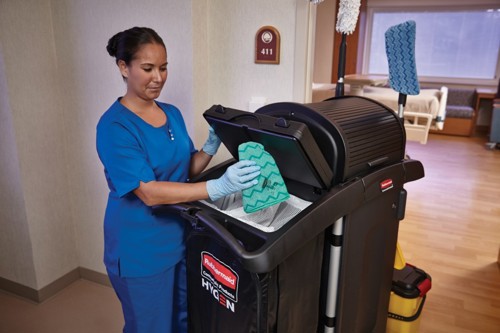
Hospitals and other care facilities, such as aged care centres, may often need to work with bed-bound patients, particularly seniors. While a hospital bed allows them to rest easily, too much time in the bed can produce excessive bacteria, which can be a leading cause of declining health. Primarily, this bacteria can be caused by excessive oils and skin particles from the patient’s skin, which can make their way onto sheets and pillowcases. Though, it can also be caused by external forces, including guests, hospital workers, and the foods patients are eating.
On top of this, with patients in beds consistently, it can be difficult to clean the walls, floors and surfaces around them. Though, neglecting to clean these surfaces can cause them to become a hub for bacteria, which can inversely cause infections that worsen a patient’s condition or cause the rapid spread of HAIs.
The following blog shows how a hospital room can still be cleaned and maintained to an infection-free standard, even while caring for bed-bound patients.
Clean all linen weekly to maintain an infection-free hospital
Our recent blog, focusing on the 2023 Cleaning Checklist, showcases that linen, no matter how antibacterial, will still eventually become infectious. Within only a few days, all sheets will become subject to several particles, which can be harmful to humans, especially those who are immune compromised.
Some of the particles include dead skin cells, body oils, sweat, dust mites and dust mite faecal matter. If left for too long, these particles can cause severe skin conditions, including rashes, welts and sores, which can create severe pain for bed-bound patients.
Washing sheets once a week is the best practice for maintaining a clean and infection-free environment. However, for bed bound patients; wash cycles should occur as little as every three days.
To minimise disruption to the patient while maintaining efficiency; beds should be stripped and cleaned during routine baths. Staff can guarantee they complete the entire bed-making process promptly by storing both soiled and clean linen on a Rubbermaid Cleaning Cart. With multiple levels available on each cart, staff can also avoid cross-contaminating linen by keeping dirty and clean sheets separately. Though, they must be mindful to wash their hands using a touch-free soap dispenser after touching soiled sheets to guarantee that bacteria does not pass onto the new linen. 
Maintain an infection-free hospital by eradicating dust
Dust can build up quickly. Unfortunately, dust is made up of thousands of microorganisms, some of which can be infectious. While it may seem harmless when it is on the floor or in an unreachable nook, should this dust become airborne, it can quickly become hazardous. Therefore, regularly dusting each hospital room is essential.
Complications to dusting occur, however, when a patient is consistently in their bed, as the risk is escalated. This is because dusting with the wrong materials can cause pathogens to quickly become airborne. In some cases, it can also cause these pathogens to become lodged in a patient's airways.
Ideally, dusting should also take place when a patient is outside the room. This may be during bathing. But, it could also be during activities such as physio or family visits. Staff should also be wary to eliminate potential sources of dust and mould, such as rotting flowers or food containers that may lay on a bedside.
Staff must be wary that if a patient cannot be removed from the room, it doesn’t mean that dusting is impossible. It simply requires the use of the right cleaning equipment. The Rubbermaid HYGEN Microfibre cloth range has been formulated to trap dust in its fibres. When cleaning with them, it can guarantee that dust does not become airborne.
Ensure bins are changed daily to maintain an infection-free hospital environment
Bins are a leading source of bacteria growth. They home food scraps, paper waste and potentially hazardous waste, which, when mixed together can encourage the growth of bacteria. Though many bins can reduce the spread of infection, like the BRUTE utility range, all bins must be considered hubs for pathogens. For this reason, they must be changed daily to prevent mould, dust and bacteria from becoming airborne.
Staff must also consider lining all bins with high-quality and durable bin liners. This can reduce the number of bacteria that grows on the vessel itself. Plus, it can boost efficiency when cleaning the room. Though this limits the bacteria that transfer onto the container, staff must remember to also wipe the interior frequently to guarantee that harmful pathogens, that may have spread into the bin, do not grow uncontrollably.
At a minimum, bin containers should be cleaned and sprayed out twice a week to prevent the presence and growth of bacteria. The Rubbermaid HYGEN range can support the cleaning process by picking up harmful pathogens from the interior and exterior. 
Rubbermaid Commercial Products is passionate about infection-free hospitals
Infection in hospitals can quickly deteriorate the health and well-being of patients. In severe cases, it can also impede the recovery of patients and may worsen their conditions. Fortunately, the Rubbermaid Commercial Products team is backed by years of experience in the commercial cleaning industry. Contact us today to find the best products for cleaning your hospital, even while patients are present in beds.